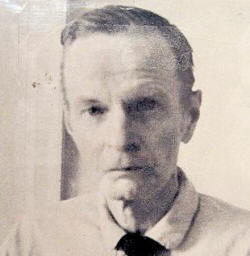Queer Places:
Columbia University (Ivy League), 116th St and Broadway, New York, NY 10027
Hotel Marseilles, 2689-2693 Broadway, New York, NY 10025
Hotel Franconia, 20 W 72nd St, New York, NY 10023
Ferncliff
Cemetery in Hartsdale, New York
 Cornell George Hopley Woolrich (December 4, 1903 – September 25, 1968) was an American novelist and short story writer. He sometimes used the pseudonyms William Irish and George Hopley.
His biographer, Francis Nevins Jr., rated Woolrich the fourth best crime writer of his day, behind Dashiell Hammett, Erle Stanley Gardner and Raymond Chandler.
Cornell George Hopley Woolrich (December 4, 1903 – September 25, 1968) was an American novelist and short story writer. He sometimes used the pseudonyms William Irish and George Hopley.
His biographer, Francis Nevins Jr., rated Woolrich the fourth best crime writer of his day, behind Dashiell Hammett, Erle Stanley Gardner and Raymond Chandler.
Woolrich was born in New York City; his parents separated when he was young. He lived for a time in Mexico with his father before returning to New York to live with his mother, Claire Attalie Woolrich.[1]
He attended Columbia University but left in 1926 without graduating when his first novel, Cover Charge, was published. As Eddie Duggan observes, "Woolrich enrolled at New York's Columbia University in 1921 where he spent a relatively undistinguished year until he was taken ill and was laid up for some weeks. It was during this illness (a Rear-Window-like confinement involving a gangrenous foot, according to one version of the story) that Woolrich started writing, producing Cover Charge, which was published in 1926."[2] Cover Charge was one of his Jazz Age novels inspired by the work of
F. Scott Fitzgerald. A second short story, Children of the Ritz, won Woolrich the first prize of $10,000 the following year in a competition organised by College Humor and First National Pictures; this led to his working as a screenwriter in Hollywood for First National Pictures. While in Hollywood, Woolrich explored his sexuality,[3] apparently engaging in what Frances M. Nevins Jr. describes as "promiscuous and clandestine homosexual activity" and by marrying Violet Virginia Blackton, the 21-year-old daughter of J. Stuart Blackton, one of the founders of the Vitagraph studio. Failing in both his attempt at marriage and at establishing a career as a screenwriter (the unconsummated marriage was annulled in 1933; Woolrich garnered no screen credits), Woolrich sought to resume his life as a novelist. When he turned to pulp and detective fiction, Woolrich's output was so prolific his work was often published under one of his many pseudonyms.[5] For example, "William Irish" was the byline in Dime Detective Magazine (February 1942) on his 1942 story "It Had to Be Murder", source of the 1954 Alfred Hitchcock movie Rear Window and itself based on H.G. Wells' short story "Through a Window". François Truffaut filmed Woolrich's The Bride Wore Black and Waltz into Darkness in 1968 and 1969, respectively, the latter as Mississippi Mermaid. Ownership of the copyright in Woolrich's original story "It Had to Be Murder" and its use for Rear Window was litigated before the US Supreme Court in Stewart v. Abend, 495 U.S. 207 (1990).
He returned to New York where he and his mother moved into the Hotel Marseilles (Broadway and West 103rd Street). Eddie Duggan observes that "[a]lthough his writing made him wealthy, Woolrich and his mother lived in a series of seedy hotel rooms, including the squalid Hotel Marseilles apartment building in Harlem, among a group of thieves, prostitutes and lowlifes that would not be out of place in Woolrich's dark fictional world".[6] Woolrich lived there until his mother's death on October 6, 1957, which prompted his move to the Hotel Franconia (20 West 72nd Street).[7] In later years, he socialized on occasion in Manhattan bars with Mystery Writers of America colleagues and younger fans such as writer Ron Goulart,[8] but alcoholism and an amputated leg (caused by an infection from a too-tight shoe which went untreated) left him a recluse. Woolrich did not attend the premiere of Truffaut's film of his novel The Bride Wore Black in 1968, even though it was held in New York City. He died weighing 89 pounds. He is interred in the Ferncliff Cemetery in Hartsdale, New York.
Woolrich bequeathed his estate of about $850,000 to Columbia University to endow scholarships in his mother's memory for writing students.
Woolrich died leaving fragments of an unfinished novel, titled The Loser; fragments have been published separately and also collected in Tonight, Somewhere in New York (2005).
My published books:


BACK TO HOME PAGE

 Cornell George Hopley Woolrich (December 4, 1903 – September 25, 1968) was an American novelist and short story writer. He sometimes used the pseudonyms William Irish and George Hopley.
His biographer, Francis Nevins Jr., rated Woolrich the fourth best crime writer of his day, behind Dashiell Hammett, Erle Stanley Gardner and Raymond Chandler.
Cornell George Hopley Woolrich (December 4, 1903 – September 25, 1968) was an American novelist and short story writer. He sometimes used the pseudonyms William Irish and George Hopley.
His biographer, Francis Nevins Jr., rated Woolrich the fourth best crime writer of his day, behind Dashiell Hammett, Erle Stanley Gardner and Raymond Chandler.
